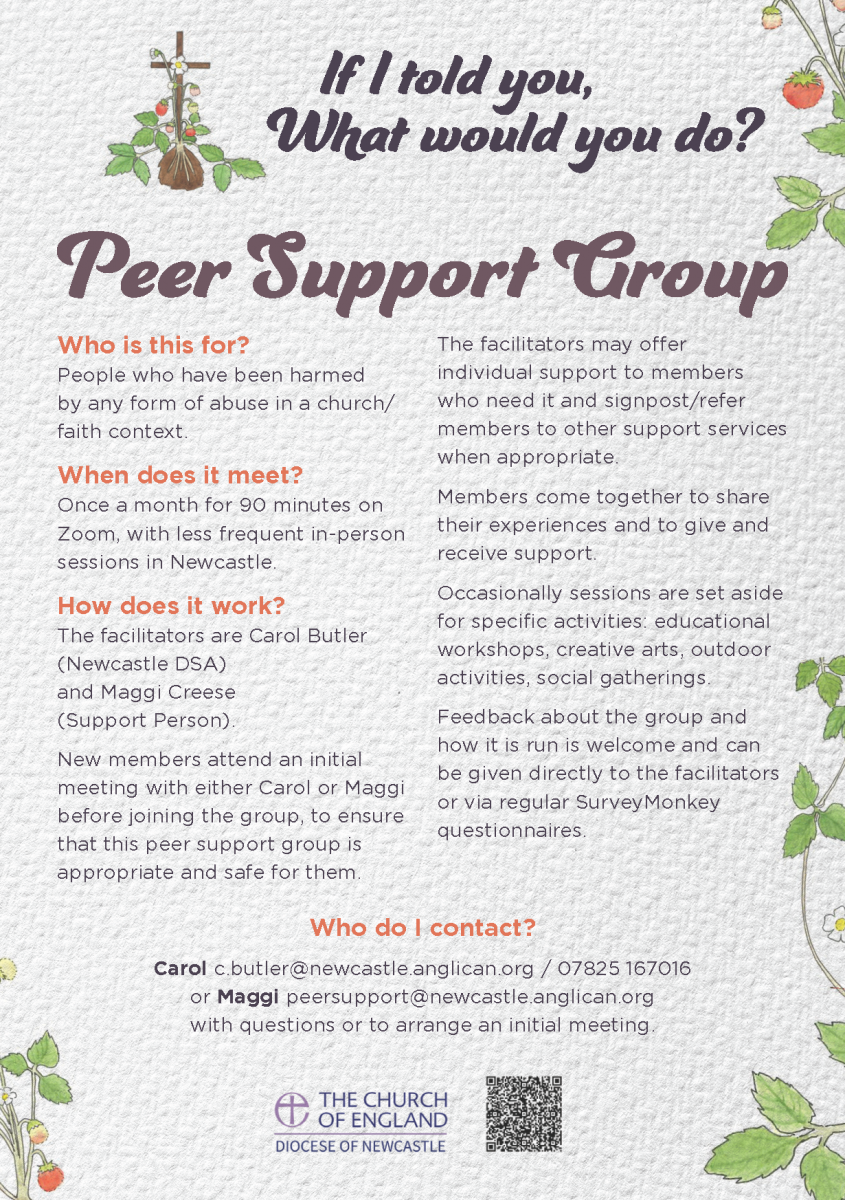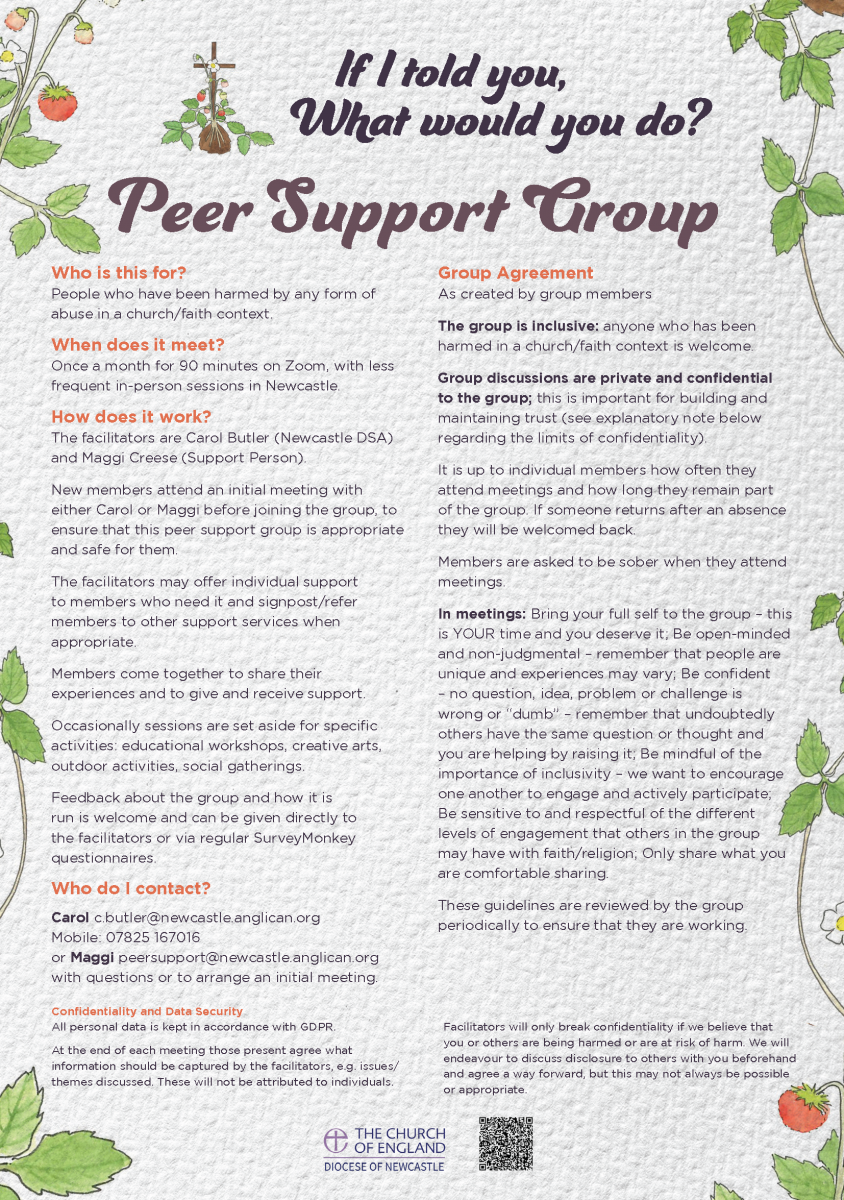 The Peer Support Group is for people who have been harmed by any form of abuse in a church/faith context. They meet once a month for 90 minutes on Zoom, with less frequent in-person sessions in Newcastle.
The Peer Support Group is for people who have been harmed by any form of abuse in a church/faith context. They meet once a month for 90 minutes on Zoom, with less frequent in-person sessions in Newcastle.
How does it work?
- The facilitators are Carol Butler (Newcastle DSA) and Maggi Creese (Support Person).
- New members attend an initial meeting with either Carol or Maggi before joining the group, to ensure that this peer support group is appropriate and safe for them.
- The facilitators may offer individual support to members who need it and signpost/refer members to other support services when appropriate.
- Members come together to share their experiences and to give and receive support.
- Occasionally sessions are set aside for specific activities: educational workshops, creative arts, outdoor activities, social gatherings.
- Feedback about the group and how it is run is welcome and can be given directly to the facilitators or via regular SurveyMonkey questionnaires.
Who do I contact?
Please contact Carol c.butler@newcastle.anglican.org / 07825 167016 or Maggi peersupport@newcastle.anglican.org with questions or to arrange an initial meeting.
Please click on the images below to download our printable poster and flyer. If you would prefer to have them printed professionally, please contact Jon Graham from Fundamental Design & Marketing at jon@fundamentaldesign.co.uk and he will be happy to help.
 |
 |
Group Agreement (as created by group members)
- The group is inclusive: anyone who has been harmed in a church/faith context is welcome.
- Group discussions are private and confidential to the group; this is important for building and maintaining trust (see explanatory note below regarding the limits of confidentiality).
- It is up to individual members how often they attend meetings and how long they remain part of the group. If someone returns after an absence they will be welcomed back.
- Members are asked to be sober when they attend meetings.
- In meetings: Bring your full self to the group – this is YOUR time and you deserve it; Be open-minded and non-judgmental – remember that people are unique and experiences may vary; Be confident – no question, idea, problem or challenge is wrong or “dumb” – remember that undoubtedly others have the same question or thought and you are helping by raising it; Be mindful of the importance of inclusivity – we want to encourage one another to engage and actively participate; Be sensitive to and respectful of the different levels of engagement that others in the group may have with faith/religion; Only share what you are comfortable sharing.
These guidelines are reviewed by the group periodically to ensure that they are working.
Confidentiality and Data Security
- All personal data is kept in accordance with GDPR.
- At the end of each meeting those present agree what information should be captured by the facilitators, e.g. issues/themes discussed. These will not be attributed to individuals.
- Facilitators will only break confidentiality if we believe that you or others are being harmed or are at risk of harm. We will endeavour to discuss disclosure to others with you beforehand and agree a way forward, but this may not always be possible or appropriate.
Online Meeting Guidelines
The zoom link is confidential to this group and must not be shared with anyone else. Please ensure you are in a private space where the group will not be overheard by anyone else in your household. Consider your own safety by thinking about what is in view of your camera.
- You can change your zoom name to a nickname if you wish.
- We will not record sessions or save chat and you must not record them or save the chat either. Only the facilitators can share screens.
- Please try to have your camera on, at least for the introductions and when you are speaking, to keep this a relational space, if your bandwidth permits.
- Please try to avoid having private side conversation in the chat, so we respect the contributions of anyone sharing in the group, by giving them our full attention.
Excerpted from “Survivors Voices: Online Meeting Safety Guidelines”; licensed under a Creative Commons license.
More on who this group is for
It may be helpful for potential members to be aware of the following parameters for this group. If any of these apply to you, the facilitators would be happy to discuss them during the initial meeting.
- An individual who has harmed others will not be admitted to the group unless the facilitators are confident that it would be safe to do so. The existing members would be informed about the request to join from such an individual beforehand, to give the group an opportunity to discuss this and ensure that they are comfortable with it.
- Anyone who holds a position of authority in a church/faith context should be mindful of the role played by power imbalances in abuse and the potential for their position to be triggering for other members of the group. It may also be important to think through the possible implications of participating in this group for your ministry, e.g. how to navigate a situation in which you encounter a member of the group outside of meetings in a church/faith context. Within the group, members must treat each other as equals, but a minister or priest could find themselves in a position of trust/authority in relation to another member outside of group activities.
- People under the age of 18 will not normally be admitted to the group. However, it may be appropriate in some cases, and the facilitators will consider requests to join from younger people and decide on a case-by-case basis, in consultation with existing members if required.
More on confidentiality
Facilitators are bound by a responsibility to disclosure information to the appropriate authorities where:
- others are at risk of harm.
- a member of the group expresses an intention to hurt themselves.
- safeguarding information needs to be shared with statutory social care services and/or criminal justice professionals to assist in the prevention, detection or prosecution of acrime.